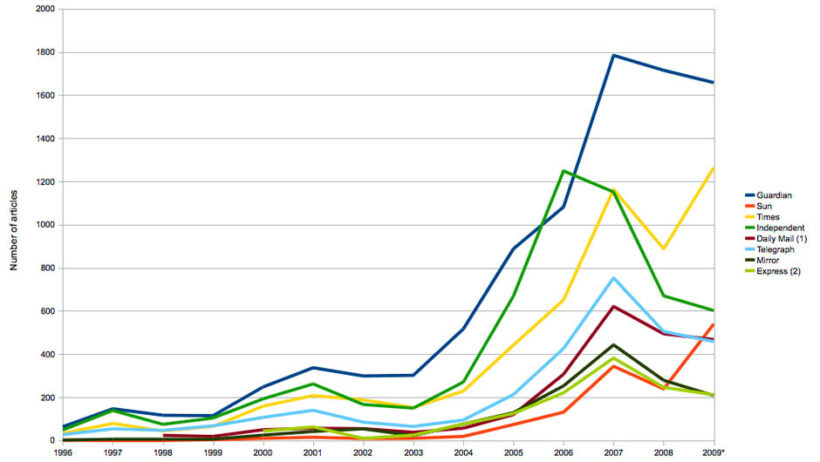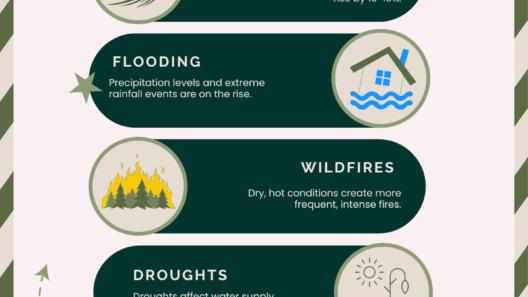As the climate crisis continues to unfold, it becomes increasingly pertinent to examine how global warming is influencing the lives of people in the UK. Is it possible to imagine an England where summer days turn into relentless heatwaves, where unpredictable weather wreaks havoc on daily routines? This poses a question worth contemplating: how are we preparing to adapt to an environment that keeps evolving at an alarming pace? Understanding the real-world impacts of global warming is essential in identifying both challenges and opportunities.
Global warming leads to a plethora of environmental changes, one of which is the rise in average temperatures. In the UK, ordinary seasonal changes have begun to exhibit erratic patterns, causing a substantial impact on agriculture and food security. Farmers are grappling with earlier spring seasons and unpredictable frost, which jeopardizes crop yields. The once-reliable rhythm of seasons has been replaced with anomalies, challenging the historic farming techniques that have sustained local communities for generations.
Moreover, the increased frequency and intensity of extreme weather events represent a growing danger. Flooding has become a more imminent threat, particularly in areas like the North of England, where rainfall patterns have shifted dramatically. The Met Office reports a significant uptick in the instances of heavy precipitation. These floods not only threaten homes but also disrupt local economies, damaging infrastructure and requiring costly repairs. Communities find themselves on the frontlines, facing trials of resilience as they invest time and resources into rebuilding after each disaster.
This brings forth another inquiry: what happens to the mindset of a community that experiences recurrent devastation? For some, it breeds a sense of helplessness, while for others, it fosters solidarity and collaboration. Community-driven initiatives focused on sustainability offer avenues towards a more resilient future. Projects aimed at enhancing green spaces, creating rain gardens, and developing flood defenses are sprouting across urban landscapes. These measures not only provide immediate relief from flooding but also foster long-term benefits by promoting biodiversity and reducing urban heat islands.
Alongside environmental modifications, public health is an area considerably affected by climate change. The UK’s National Health Service (NHS) has been closely monitoring how worsening air quality impacts respiratory health. Increased temperatures contribute to higher levels of ground-level ozone, exacerbating conditions such as asthma and chronic obstructive pulmonary disease (COPD). Vulnerable populations, including the elderly and those with pre-existing health conditions, face heightened risks. Thus, preparing adequate public health responses becomes paramount, targeting preventative measures and raising awareness regarding these atmospheric changes.
Furthermore, the psychological toll of climate change cannot be understated. Climate anxiety is increasingly infiltrating the consciousness of younger generations, who grapple with existential fears surrounding their future. The phenomenon, known as “eco-anxiety,” leaves individuals feeling disempowered, often questioning their ability to effect change. Here lies another challenge: how to channel the energy of youth activism into constructive action that not only combats climate change but also fosters mental well-being?
Policy measures play a critical role as well. The UK’s commitment to achieving net-zero carbon emissions by 2050 is ambitious, yet the efficacy of these policies hinges on public engagement and compliance. Initiatives centered around renewable energy, such as wind and solar power, represent a commendable step towards sustainability. However, there are multifaceted concerns that arise with these endeavors, including the impact on local wildlife and landscapes. By striking a balance between development and conservation, the UK can innovate its way to a cleaner energy future.
Moreover, urban planning is an essential aspect of addressing climate change. The rise of ‘sponge cities’ and green roofs demonstrates innovative thinking geared towards urban resilience. Such designs absorb excess rainwater, mitigate urban flooding, and improve air quality—all crucial factors as global temperatures rise. As cities evolve, they can become not just habitable spaces, but thriving ecosystems that promote human and environmental health alike.
Another noteworthy consequence of global warming is its impact on biodiversity. Habitats are shifting, and species once native to particular regions are struggling to adapt or relocate. The UK’s rich tapestry of wildlife may become overshadowed by species extinction, with cascading effects on ecosystem stability. Engaging in conservation efforts, such as habitat restoration and wildlife corridors, is essential for mitigating the loss of biodiversity. How we respond to diminishing species will significantly influence ecological balance and the health of our environments.
This outlines the importance of both individual and collective action in the fight against climate change. The challenges are formidable, yet they also present unique opportunities for growth and innovation. As citizens of the UK, embracing sustainable practices, whether through lifestyle changes or community involvement, can foster resilience in the face of global warming. As we collectively navigate these challenges, the spirit of adaptability will prove invaluable.
As we reflect on these issues, consider the curious thought: will we find ourselves navigating an uncertain future or emerge as pioneers of change, demonstrating that hope can thrive even in adversity? By coming together, we have the capacity to carve out solutions that prioritize both people and the planet, ensuring a sustainable and vibrant future for generations to come.







